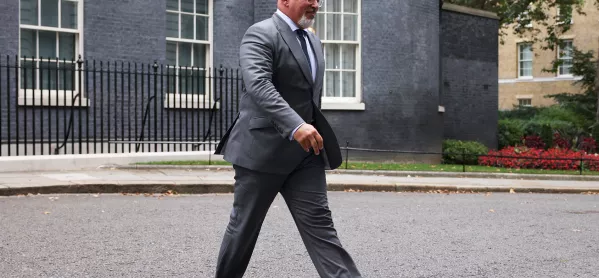Zahawi’s first month: What we know so far

A careers adviser once told me that the best way to succeed in a job is to take over from someone serially incompetent. Then you can’t help but look good by comparison.
Nadhim Zahawi didn’t choose his new posting as education secretary, but he certainly benefits from the low bar set by his predecessor.
There is a genuine sense of relief and reinvigoration among senior civil servants that they have a minister who at least seems engaged and interested in driving change.
School funding will be key for Nadhim Zahawi
Zahawi is looking to make the same impression on the sector as a whole. One of his goals is to rebuild bridges burnt during the disastrous handling of the pandemic.
We’ve had many warm words about his affinity for teachers, and this does matter: it’s hard to bring people in when you’re constantly demeaning them in the media.
However, most heads and teachers will want to see meaningful action before deciding on the merits of their new secretary of state.
The first big test will come over half-term when thechancellor announces the three-year spending settlement for government departments.
The government rejected Sir Kevan Collins’ £15 billion Covid education recovery package earlier this year, while indicating that more would be forthcoming at the spending review.
But the signs are that the Treasury is digging in and trying to avoid handing over any more cash.
Given the ongoing problems with absenteeism, learning loss, a massive increase in mental health referrals and so on, this simply isn’t credible.
There is also the question as to how the government will be able to meet its manifesto pledge of £30,000 starting salaries for teachers unless regular school budgets rise significantly.
If schools are asked to fund this out of existing budgets, any attempt to build bridges will end abruptly.
Reading between the lines
Beyond the spending review, we have a few clues - one month in - as to Zahawi’s interests.
It’s now been confirmed that there will be a White Paper in the new year (which could mean any time from January to December in civil service language).
The focus, we’re told, will be on literacy and numeracy, though that doesn’t really narrow it down much.
Without additional funding, it’s hard to see what the Department for Education could do specifically to improve literacy and numeracy beyond more testing and accountability.
A return of key stage 3 Sats has been mooted, though this would do little beyond narrowing the secondary curriculum.
Elsewhere there have been hints of interest in making more use of technology - AI as a teaching tool has been mentioned - a subject that was largely forbidden in the DfE while Nick Gibb was in post as schools minister.
And it is considered likely that this White Paper will have to engage with structural questions around academies and local authorities that have been left unanswered since Nicky Morgan’s 2016 White Paper was thrown in the bin.
Exam reform
One big question is whether Zahawi wants to take a serious look at assessment reform.
There is a growing campaign in Westminster, led by his friend, Commons Education Select Committee chair Robert Halfon, and the Times Education Commission, to “scrap” GCSEs.
There has been zero appetite for this in the government to date but Zahawi is thought to be more open to the idea.
I suspect his key policy advisers - Mark Lehain and Will Bickford Smith - will talk him out of any substantive changes as they take the Gibb/Gove view of exams rather than the Halfon one.
As ever, all of these interesting policy discussions will be waylaid to some degree by events and crises, some of which are more predictable than others.
It doesn’t take a superforecaster to see we’re heading into another teacher recruitment crisis with the highest number of job vacancies nationally since records began, and private sector salaries increasing rapidly.
Nor do you need to be Nostradamus to see that next summer’s exam season could be very tricky, given that it will involve the biggest drop in grades we’ve ever had.
Other problems are already playing out - SEND is in crisis with the review due over two years ago nowhere in sight.
The downside of taking over from someone incompetent is there are a lot of messes to clean up.
Nevertheless, it is good to finally have some energy and enthusiasm around education policy again, and at this stage Zahawi has the benefit of the doubt.
If, though, he can’t secure any more funding for the sector or show that he understands the serious challenges the profession faces, he won’t have it for long.
Sam Freedman is a former senior policy adviser at the Department for Education and a senior fellow at the Institute of Government
You need a Tes subscription to read this article
Subscribe now to read this article and get other subscriber-only content:
- Unlimited access to all Tes magazine content
- Exclusive subscriber-only stories
- Award-winning email newsletters
Already a subscriber? Log in
You need a subscription to read this article
Subscribe now to read this article and get other subscriber-only content, including:
- Unlimited access to all Tes magazine content
- Exclusive subscriber-only stories
- Award-winning email newsletters
topics in this article



